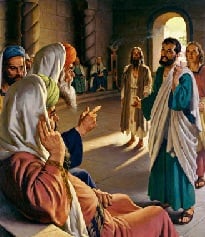Sunday: The Preachers Pay a Price
Read Acts 17:5-9. According to this passage, what was the primary motivation for the opposition to Paul’s message? What statements did his opponents make to get the city authorities interested in the case? How did those authorities respond?
When someone preaches new teachings and people get excited, the leaders and teachers of other religious groups may become jealous. Attention that was once placed upon themselves is now directed to others. As a result, they may behave in irrational ways in order to try to reduce the influence of the new teacher.
According to the Roman historian Suetonius, shortly before the events described in Acts 17, conflict arose among the Jews of Rome over a man Suetonius calls “Chrestus.” This term probably reflects a Roman misunderstanding of the Jewish concept of the Messiah, or, in Greek,“the Christ.” Apparently someone’s preaching of the gospel had just split the Jewish community of Rome.
To Roman officials, debate over the Messiah sounded like preparation for the installation of a new king on the throne of Rome (see Acts 17:7). Probably for that reason, the emperor expelled all Jews from his capital city (Acts 18:2). Some of these exiles settled in or passed through Thessalonica, bringing knowledge of these events to the city. Because the gospel had turned the world of Rome’s Jews upside down, religious leaders in Thessalonica were determined to prevent something similar from happening there.
Thessalonica itself was ruled by a city council of perhaps five or six “mayors” who made decisions as a group. This arrangement allowed for a considerable amount of independence from Rome, which they would be loath to give up. So, the behavior of the city officials in this matter was quite impressive under the circumstances. The similarity to recent events in Rome could have led to severe physical punishment for the new Christians. Instead, the city leaders responded even-handedly (contrast Acts 16:22-40). They took a significant amount of money from the new Christians as security so that they would not be the cause of further disturbances. Then the leaders let everyone go.
Jealousy and envy can destroy us. What can we learn from the life and teachings of Jesus that can help us gain victory over these deadly sentiments?


Thank for giving us the opportunity to read the lesson on line.
I am delighted to be part of this group.
Thanks for allowing me to study the lesson
We should not be upset, jealous, envy, dismay or discourage when we meet oppositions or persecution while preaching the truth i.e words of God, instead let us be of good cheer and be glad because it motivates, empowers, and strengthens us in the faith we have in Christ Jesus. As we do so God’s grace will be upon us, AMEN!
That’s very true, Amen.
Jealousy handcuffs God, thus preventing Him from doing for us the very thing or things of which we are envious. Please cleanse our hearts, Jesus.
This lesson brings out an important message to all the churchs in the world today. WE, as believers, have the Word of God to teach truth not error. It has been prophesied that in the last days men will change the laws of God. Men need to study for themselves like the Thessalonians did to show truth .
How strange it is, that men should grudge others the priviledges they will not themselves accept!
Eish I dont know, am I a real Christian? Am I preaching the word of God? We all have to ask ourselves that question. See the prices that these preachers paid, it’s not only Paul and Silas, Jesus Christ hinself paid a price, John the baptist yes, John the Revelator how about Peter! Oh my God I think I have to step up my reaching out as a Christian. I am not doing enough when it comes to spreading the word! I think as a Christian I need to have a Crusade at least once a year so that the word of God may go all dimensions.